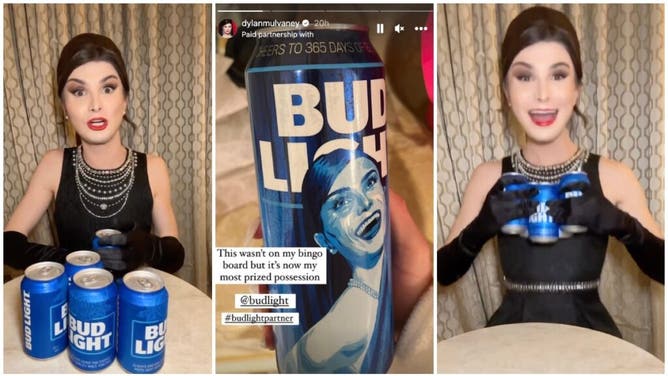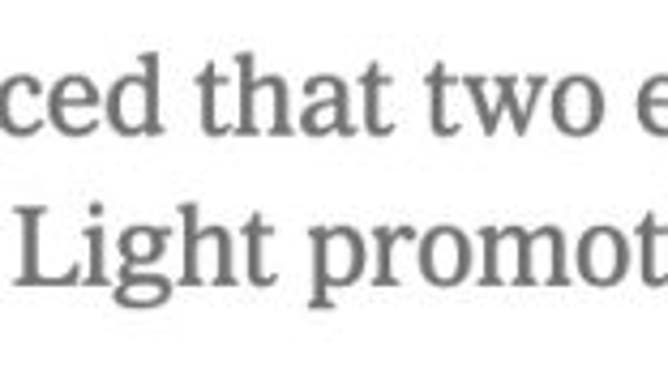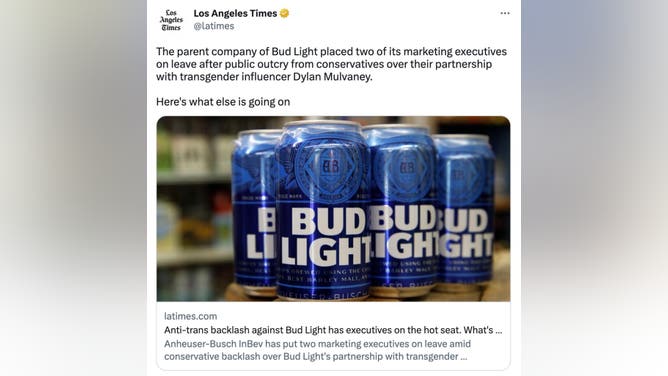New York Times Blames Conservatives For Bud Light/Dylan Mulvaney Backlash
The New York Times published a wild frame on the fallout Bud Light is facing.
For the past several weeks, the Anheuser-Busch beer brand has been under intense scrutiny for partnering up with transgender activist Dylan Mulvany.
It's been all over social media and the news. The only way you wouldn't know about the outrage is if you're living with your head in the sand.
Enter The New York Times, which woke up Tuesday to take a deep dive into the situation.

Bud Light is still taking heat for teaming up with Dylan Mulvaney. (Credit: Instagram and Twitter)
The New York Times blames conservatives for Dylan Mulvaney/Bud Light fallout.
The publication released an article titled, "Ad Flap Leaves Bitter Aftertaste for Bud Light and Warning for Big Business," and the message is simple: conservatives are to blame for Bud Light's headaches. Not the marketing executives who stupidly went woke. It's conservatives who are the issue.
The article states, in part, the following:
On April 1, Ms. Mulvaney posted a video on her Instagram account showing off a custom Bud Light can featuring her face, which brand marketers had sent her as part of a March Madness promotion. A backlash and boycott quickly followed, driven by conservative media outlets and personalities like the musician Kid Rock, who posted an expletive-laden video on Instagram of himself mowing down several cases of the beer with a submachine gun.
A photo caption at the top of the article also featured a very carefully crafted selection of words and stated, "Anheuser-Busch InBev announced that two executives were on leave after a conservative backlash to a Bud Light promotion."
Again, it's just conservatives who are the problem. If it weren't for Kid Rock, John Rich and "conservative media outlets," nobody would care.
Well, that's what The New York Times, which did publish two previous light articles on the issue, wants people to believe.

The New York Times blames conservatives for Bud Light/Dylan Mulvaney backlash. (Credit: New York Times screenshot)
Are famous conservatives to blame for Bud Light's problems?
Blaming Kid Rock and a small, select handful of right-leaning (better described as common sense, anti-woke outlets) for Bud Light's issues is a galaxy brain take that assumes the average consumer is an idiot.
In order for people to believe Kid Rock is controlling the masses, you have to believe the average Bud Light drinker is so dumb they can't think for himself.
Many of you reading this probably enjoyed an occasional Bud Light before the company went woke. Do you consider yourself a dumb sheep who only follows advice from famous people? I think not.
Of course The New York Times isn't interested in truly dissecting the issue here. People are offended by Mulvaney, who The NYT refers to as simply "a transgender influencer," because his entire brand is mocking women and behaving like a female child.
Do you have to be conservative to be offended by that or do rational common sense people find that kind of behavior appalling?

Bud Light is under fire for teaming up with Dylan Mulvaney. (Photo by Drew Angerer/Getty Images)
The New York Times isn't alone on this issue.
The New York Times isn't the only publication to frame this issue as hyper-partisan instead of common sense people annoyed their beer went woke. The Los Angeles Times published a headline that stated, in part, "Anti-trans backlash against Bud Light has executives on the hot seat."
Yes, a news article features a highly-editorialized headline claiming if you're against this insanity, you must be "anti-trans." This isn't an opinion piece from the LA Times. It was straight news.

The Los Angeles Times refers to people upset with Bud Light as "anti-trans." (Credit: Twitter Screenshot)
You don't need to be a MAGA Republican to understand why Dylan Mulvaney is offensive and why the collaboration with the beer brand was a terrible idea. Of course, the media doesn't care. Some outlets will apparently defend multinational corporations no matter what!